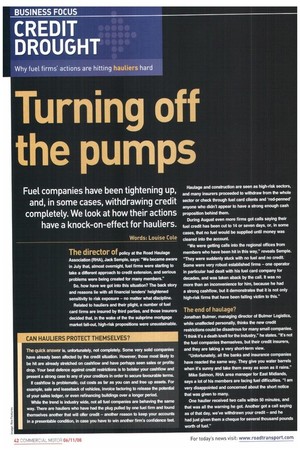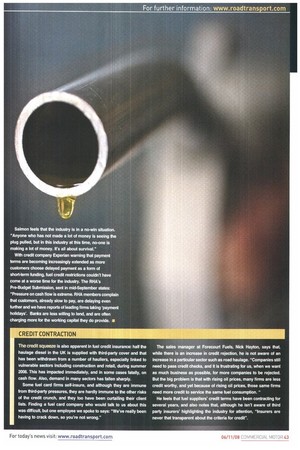Turning off the pumps
Page 42

Page 43

If you've noticed an error in this article please click here to report it so we can fix it.
Fuel companies have been tightening up, and, in some cases, withdrawing credit completely. We look at how their actions have a knock-on-effect for hauliers.
Words: Louise Cole The director of policy at the Road Haulage Association (RHA), Jack Semple. says: "We became aware in July that, almost overnight, fuel firms were starting to take a different approach to credit extension, and serious problems were being created for many members."
So, how have we got into this situation? The back story and reasons lie with all financial lenders' heightened sensitivity to risk exposure — no matter what discipline.
Related to hauliers and their plight, a number of fuel card firms are insured by third parties, and those insurers decided that, in the wake of the the subprime mortgage market fall-out, high-risk propositions were unsustainable. Haulage and construction are seen as high-risk sectors, and many insurers proceeded to withdraw from the whole sector or check through fuel card clients and 'red-penned' anyone who didn't appear to have a strong enough cash proposition behind them.
During August even more firms got calls saying their fuel credit has been cut to 14 or seven days, or, in some cases, that no fuel would be supplied until money was cleared into the account.
"We were getting calls into the regional offices from members who have been hit in this way," reveals Semple. "They were suddenly stuck with no fuel and no credit. Some were very robust established firms — one operator in particular had dealt with his fuel card company for decades, and was taken aback by the call. It was no more than an inconvenience for him, because he had a strong cashf low, but it demonstrates that it is not only high-risk firms that have been falling victim to this."
The end of haulage?
Jonathan Bulmer, managing director of Bulmer Logistics, while unaffected personally, thinks the new credit restrictions could be disastrous for many small companies. "[think it's a death knell for the industry," he states. "It's not the fuel companies themselves, but their credit insurers, and they are taking a very short-term view.
"Unfortunately, all the banks and insurance companies have reacted the same way. They give you water barrels when it's sunny and take them away as soon as it rains."
Mike Salmon, RHA area manager for East Midlands, says a lot of his members are facing fuel difficulties. "I am very disappointed and concerned about the short notice that was given to many.
One haulier received two calls within 50 minutes, and that was all the warning he got. Another got a call saying as of that day, we've withdrawn your credit — and he had just given them a cheque for several thousand pounds worth of fuel." Salmon feels that the industry is in a no-win situation. "Anyone who has not made a lot of money is seeing the plug pulled, but in this industry at this time, no-one is making a lot of money. It's all about survival."
With credit company Experian warning that payment terms are becoming increasingly extended as more customers choose delayed payment as a form of short-term funding, fuel credit restrictions couldn't have come at a worse time for the industry. The RHA's Pre-Budget Submission, sent in mid-September states: 'Pressure on cash flow is extreme. RHA members complain that customers, already slow to pay, are delaying even further and we have reports of leading firms taking 'payment holidays'. Banks are less willing to lend, and are often charging more for the working capital they do provide.




























































































































































